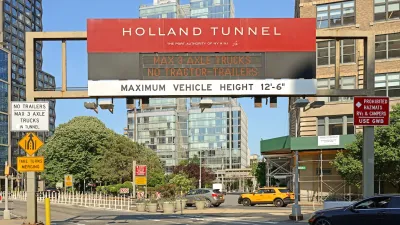The Metropolitan Transportation Authority has resubmitted its environmental impact assessment to federal officials, who sent the agency over 400 additional questions earlier this year.

According to an article by Stephen Nessen in Gothamist, New York’s Metropolitan Transportation Authority (MTA) has completed its response to over 400 questions sent to the agency by the Federal Highway Administration (FHA) regarding the environmental impact of the city’s proposed congestion pricing scheme, a key step in moving forward with implementation of the program. The program would enact cordon pricing (a fee charged for entering a specific area) south of 60th Street in Manhattan.
“Once the Federal Highway Administration (FHWA) approves the MTA’s environmental assessment the MTA still has a long way to go. It must conduct more public outreach, install devices to collect the tolls, and set a price that will ultimately raise $1 billion a year in revenue.” As Nessen points out, the program was initially scheduled to begin collecting revenue in 2021, but the MTA now expects. However, “Because congestion pricing was first delayed by the Trump administration, and then by the pandemic, and finally by the recent round of federal questions, the 2020-2024 capital plan will be in its last year by the time congestion pricing is actually generating revenue.”
A June 2022 poll found that 42 percent of New Yorkers intend to drive less, and 64 percent would make the switch to public transit, if congestion pricing took effect. The program would exempt New Yorkers who live in the congestion zone and earn less than $60,000 per year.
FULL STORY: MTA’s congestion pricing program back on track, again

Planetizen Federal Action Tracker
A weekly monitor of how Trump’s orders and actions are impacting planners and planning in America.

Maui's Vacation Rental Debate Turns Ugly
Verbal attacks, misinformation campaigns and fistfights plague a high-stakes debate to convert thousands of vacation rentals into long-term housing.

Restaurant Patios Were a Pandemic Win — Why Were They so Hard to Keep?
Social distancing requirements and changes in travel patterns prompted cities to pilot new uses for street and sidewalk space. Then it got complicated.

In California Battle of Housing vs. Environment, Housing Just Won
A new state law significantly limits the power of CEQA, an environmental review law that served as a powerful tool for blocking new development.

Boulder Eliminates Parking Minimums Citywide
Officials estimate the cost of building a single underground parking space at up to $100,000.

Orange County, Florida Adopts Largest US “Sprawl Repair” Code
The ‘Orange Code’ seeks to rectify decades of sprawl-inducing, car-oriented development.
Urban Design for Planners 1: Software Tools
This six-course series explores essential urban design concepts using open source software and equips planners with the tools they need to participate fully in the urban design process.
Planning for Universal Design
Learn the tools for implementing Universal Design in planning regulations.
Heyer Gruel & Associates PA
JM Goldson LLC
Custer County Colorado
City of Camden Redevelopment Agency
City of Astoria
Transportation Research & Education Center (TREC) at Portland State University
Jefferson Parish Government
Camden Redevelopment Agency
City of Claremont





























